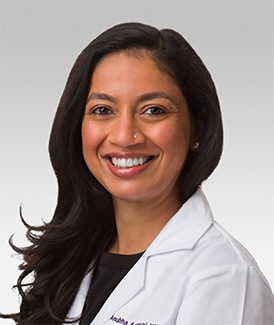Improving heart failure care in Southern India
20th Anniversary of Global Health Fellows and Scholars

Dr. Anubha Agarwal emigrated from India to the United States with her family when she was about 5 years old. As many immigrant families do, she spent much of her childhood going back and forth, visiting her family in India. During those trips, Agarwal realized the stark differences between the two countries. "Witnessing the inequities between the countries and within each country, I wanted to solve them. Later, I realized that I wanted to do that as a physician," she said.
During medical school, Agarwal was quickly drawn to cardiology as a specialty but felt unsure how to integrate that into her goal of solving health inequities in India. This changed once she began working with Dr. Gerald Bloomfield, one of Fogarty's first-ever cardiology fellows, as part of AMPATH, a partnership between Moi University, Moi Teaching and Referral Hospital, Indiana University, and the Kenyan government. With Bloomfield's mentorship and guidance, she decided to apply for a Fogarty fellowship.
The overarching goal of Agarwal's Fogarty year was to answer the question: How can we improve heart failure care in South India? She worked in the state of Kerala, where her first step was to conduct a systematic review of existing heart failure intervention programs. While many improvement programs existed, all had been studied and refined in high-income countries, making it a challenge to understand how they might work in low-income settings. Agarwal and her colleagues then took that data and conducted qualitative interviews with physicians, nurses, patients, and pharmacists, asking them what they think needed to be done to improve heart failure care. From there, they designed their quality improvement intervention and tested it amongst 1,400 heart patients in Kerala over six months.
This marked the end of her Fogarty project, but the work on a heart program tailored for Kerala continues.
Using her Fogarty data, Agarwal applied for and was awarded a Pathway to Independence grant from the National Heart, Blood, and Lung Institute. With this grant, she and her team will work again in Kerala evaluating a polypill that combines four different classes of medications into one pill for patients with heart failure. Her mentors on this related project are a direct extension of her Fogarty experience. Dr. Mark Huffman, a professor of medicine and co-director of Washington University's Global Health Center, is her primary mentor--and, like Bloomfield, is another of Fogarty's first cardiology fellows. Dr. Dorairaj Prabhakaran, vice president and director of the Centre for Control of Chronic Conditions at the Public Health Foundation of India, will also serve as her mentor as he did previously during her fellowship.
"My Fogarty fellowship was foundational to what I will spend the next five years of my life working on," said Agarwal. "My Fogarty year was the most impactful year of my life, both personally and professionally."
Today, Agarwal is working at Washington University in St. Louis as an assistant professor and co-director of their global cardiovascular health program. She spends about a quarter of her time working with patients; the rest is spent on research related to her project in Kerala. "I have progressed significantly since my Fogarty year due to phenomenal mentorship," said Agarwal. "Now, when I think about my leadership priorities, mentorship is at the forefront."
Agarwal is committed to her new project, global health and her growing family, which have all come together at once. During her first stint in Kerala, Agarwal met her husband, who already lived in India. The new couple, along with their recently born child, plan to split their time between Kerala and the U.S. in the coming years.
Agarwal's advice to those considering a Fogarty fellowship: Take the risk. "It can be difficult to take a year off for your study when you are on the physician track in the U.S., but you never know where it can take you."
More Information
Updated June 14, 2023
To view Adobe PDF files,
download current, free accessible plug-ins from Adobe's website.
Related Fogarty Programs
Related World Regions / Countries
Related Global Health Research Topics